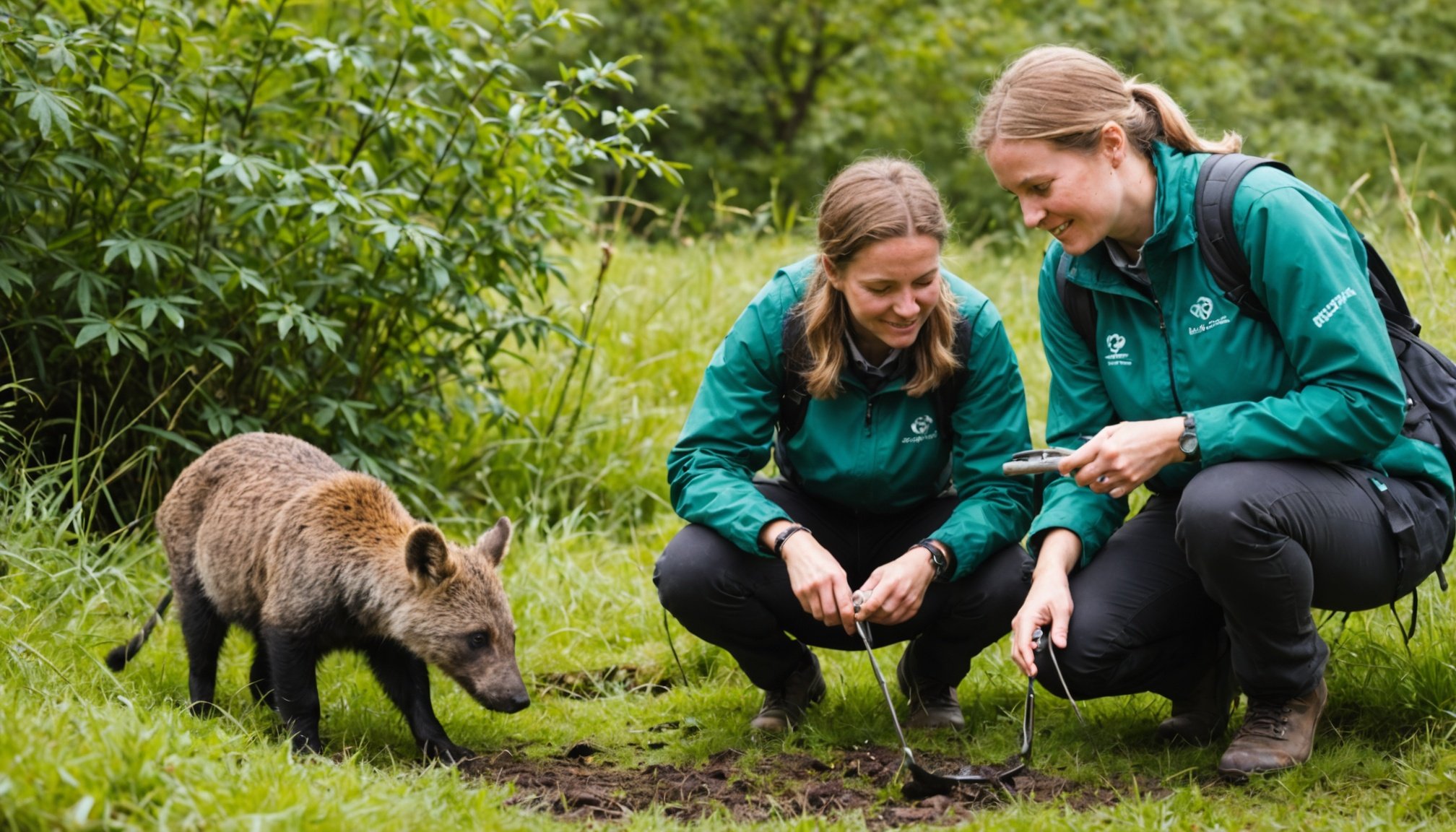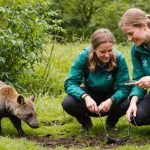Unlocking the Rewards of Wildlife Conservation Volunteering in the UK: Why You Should Get Involved!
Why Wildlife Conservation Volunteering Matters
In the UK, wildlife conservation is more crucial than ever, given the alarming rate of species decline and habitat loss. Volunteering in this field not only helps protect the environment but also offers a myriad of personal benefits. Whether you are passionate about nature, looking to enhance your career, or simply seeking a way to give back, wildlife conservation volunteering is an enriching experience that can transform your life and the lives of those around you.
The Impact on Wildlife and Ecosystems
Volunteering for wildlife conservation can make a significant difference in the health and wellbeing of ecosystems. For instance, projects like those undertaken by the Royal Society for the Protection of Birds (RSPB) involve setting up fundraising stands, engaging with the public, and generating new memberships to support conservation efforts. These initiatives help in protecting and restoring habitats, which in turn support a diverse range of wildlife[1].
A lire également : Essential Insights for UK Pet Owners: How Nature Reserve Walks Can Affect Local Wildlife
The collaboration between the Met Office and The Wildlife Trusts is another exemplary model. This partnership has led to projects that examine the impacts of weather and climate change on wildlife, such as mapping suitable climates for reintroducing rare plant species and analyzing the effects of climate variables on the nesting survival of Barn Owls in Northern Ireland[5].
Types of Volunteering Opportunities
The UK offers a wide array of volunteering opportunities that cater to different interests, skills, and availability.
En parallèle : Reviving Urban Ecosystems: The Impact of UK”s Canal Restoration Projects on Biodiversity
Outdoor Volunteering
For those who love the outdoors, organizations like The Conservation Volunteers (TCV) provide hands-on experience in activities such as tree planting, wildflower meadow management, and pond management. The Richmond Biodiversity Action Team, for example, undertakes various projects in urban and rural areas, including hedge laying, wildlife refugia, and footpath clearance. These activities not only contribute to a better local environment but also offer a chance to meet new people and learn new skills[4].
Desk-Based Roles and Campaigns
It’s not all about getting outdoors; there are plenty of opportunities for desk-based roles, campaigns, and awareness-raising. Volunteering with organizations like the RSPB or The Wildlife Trusts can involve working on fundraising campaigns, data management, or policy work. These roles are essential for the administrative and strategic aspects of conservation efforts and can be just as rewarding as fieldwork[2].
Benefits for Volunteers
Volunteering in wildlife conservation is not just about giving; it also offers numerous benefits for the volunteers themselves.
Personal Growth and Skills Development
Volunteering provides an excellent opportunity to develop new skills and gain valuable experience. Whether it’s learning about wildlife surveys with the British Trust for Ornithology (BTO) or acquiring practical skills in conservation with TCV, these experiences can be instrumental in shaping your career in conservation. Many organizations also offer training and support to ensure that volunteers are well-equipped for their roles[3].
Health and Wellbeing
Engaging in physical activity through volunteering can significantly improve your health and wellbeing. Activities such as tree planting, pond management, and footpath clearance are not only eco-friendly ways to stay fit but also offer a chance to enjoy beautiful surroundings. Volunteering can also have a positive impact on mental health by providing a sense of purpose and community[4].
Community and Social Benefits
Volunteering is a great way to meet new people and build social connections. Many organizations, such as The Wildlife Trusts and the RSPB, have vibrant communities of volunteers who work together towards a common goal. These social interactions can lead to lasting friendships and a sense of belonging[3].
Practical Insights and Actionable Advice
If you are considering volunteering in wildlife conservation, here are some practical insights and actionable advice to get you started:
Finding the Right Opportunity
- Research Organizations: Look for organizations that align with your interests and values. The RSPB, The Wildlife Trusts, and TCV are some of the prominent organizations in the UK.
- Check Volunteer Opportunities: Websites like Green Jobs for Nature and Nature.Scot provide comprehensive lists of volunteering opportunities across various organizations[2][3].
Preparing for Your Role
- Training and Support: Many organizations offer comprehensive training to equip you with the necessary knowledge and skills. For example, the RSPB provides training for its Membership Fundraisers to ensure they are comfortable engaging with the public and spreading awareness about conservation efforts[1].
- Flexibility: Consider the flexibility of the role. Some positions, like those with the RSPB, offer the option to choose between three and five days per week, which can be ideal for those balancing other commitments[1].
Making the Most of Your Experience
- Be Open to Learning: Volunteering is a great opportunity to learn new skills and gain knowledge. Be open to learning from experts and other volunteers.
- Network and Build Connections: Volunteering provides a chance to meet like-minded people. Build connections and network within the community to enhance your experience and future opportunities.
Real-Life Experiences and Testimonials
To get a better understanding of what it’s like to volunteer in wildlife conservation, let’s look at some real-life experiences.
Megan Brown, Membership Fundraiser with the RSPB
“I’ve done two years as a Membership Fundraiser with the RSPB. It has flown by, but at the same time I feel so comfortable and accomplished in my role. It’s taken me to some stunning locations and fantastic events, while meeting and working with some amazing people. I love working for a cause that’s always been my passion: wildlife conservation. I’ll continue to inspire action for nature until we’re no longer one of the most nature-depleted countries in the world.”[1]
Nick Ashby, Membership Fundraiser with the RSPB
“I’ve been a fundraiser with the RSPB for three years and I can honestly say it’s the best job I’ve ever had. I’ve always had a love of nature and it’s very rewarding to now have a role where I can play my part in tackling the nature crisis we currently face. I love the variety of the role: one day I could be working at one of our wonderful reserves and the next I could be at a festival or a country park. Having spent most of my previous career staring out of the same office window, it’s amazing that my view changes every day. I’ve always enjoyed learning, and this role gives that opportunity, from the time I get to do my own research to the knowledge I get from chatting to the public. I feel very lucky to have a job that doesn’t feel like work and one I look forward to doing every time I set off for a shift.”[1]
Benefits and Support for Volunteers
Volunteering in wildlife conservation often comes with a range of benefits and support.
Comprehensive Benefits Packages
- Annual Leave and Holidays: Many organizations offer generous annual leave packages. For example, the RSPB provides 34 days of annual leave, rising to 36 days after three years and 38 days after five years[1].
- Health and Wellbeing Support: Organizations often provide access to confidential support services, including counselling, sick pay, and flu vaccines[1].
- Professional Development: Opportunities for professional development, such as training and the chance to take a sabbatical after five years of service, are also available[1].
Financial Support and Funding
- Travel and Equipment Costs: Many organizations cover travel and equipment costs, ensuring that volunteers can focus on their work without additional financial burdens[1].
- Conservation Scholarships: Some organizations offer conservation scholarships or green loans to support volunteers in their educational and professional pursuits[1].
Volunteering in wildlife conservation in the UK is a rewarding and enriching experience that offers a wide range of benefits, from personal growth and skills development to improved health and wellbeing. Whether you are passionate about nature, looking to enhance your career, or simply seeking a way to give back, there are numerous opportunities available that cater to different interests and availability.
So why not get involved? Here are some key points to consider:
- Diverse Opportunities: From outdoor activities like tree planting and pond management to desk-based roles in fundraising and policy work, there is something for everyone.
- Personal Growth: Gain new skills, learn from experts, and build valuable experience.
- Health and Wellbeing: Improve your physical and mental health through engaging in eco-friendly activities.
- Community and Social Benefits: Meet new people, build social connections, and be part of a vibrant community.
- Support and Benefits: Enjoy comprehensive benefits packages, including annual leave, health support, and professional development opportunities.
By volunteering in wildlife conservation, you not only contribute to the protection and preservation of nature but also embark on a journey of personal growth and fulfillment.
Table: Comparison of Volunteering Opportunities
| Organization | Type of Volunteering | Benefits | Requirements |
|---|---|---|---|
| RSPB | Face-to-Face Fundraising | Comprehensive training, flexible working hours, annual leave, health support | Driver’s license, willingness to work outdoors and independently[1] |
| The Wildlife Trusts | Various projects (outdoor and desk-based) | Opportunities for skill development, social connections, health benefits | Varies depending on the project; some require specific skills or experience[2][3] |
| TCV | Outdoor conservation projects | Learning new skills, social connections, health benefits | No prior practical skills required; minimum age 16 with adult supervision[4] |
| Met Office and The Wildlife Trusts | Climate change projects | Opportunities for skill development, contributing to significant research | Specific skills or experience may be required; civil service volunteering days available[5] |
Detailed List of Benefits for Volunteers
- Meet new people and have regular social contacts
- Volunteering provides a chance to build lasting friendships and a sense of community.
- Have fun and learn new skills
- Gain hands-on experience in various conservation activities and learn from experts.
- Get and stay fit the eco-friendly way
- Engage in physical activities that contribute to a better local environment.
- Contribute to a better local environment
- Make a tangible difference in the health and wellbeing of ecosystems.
- Enjoy beautiful surroundings
- Work in stunning locations and enjoy the natural beauty of the UK.
- Comprehensive training and support
- Receive training and support to ensure you are well-equipped for your role.
- Flexible working hours
- Choose from various schedules to fit your volunteering around other commitments.
- Annual leave and holidays
- Enjoy generous annual leave packages, including bank holidays.
- Health and wellbeing support
- Access confidential support services, including counselling, sick pay, and flu vaccines.
- Professional development opportunities
- Take advantage of training, sabbaticals, and other professional development opportunities.
- Financial support and funding
- Benefit from travel and equipment costs being covered, and access to conservation scholarships or green loans.
By unlocking the rewards of wildlife conservation volunteering, you can make a significant difference in the world around you while enriching your own life in countless ways. So, take the first step today and join the community of dedicated individuals working towards a greener, more sustainable future.











